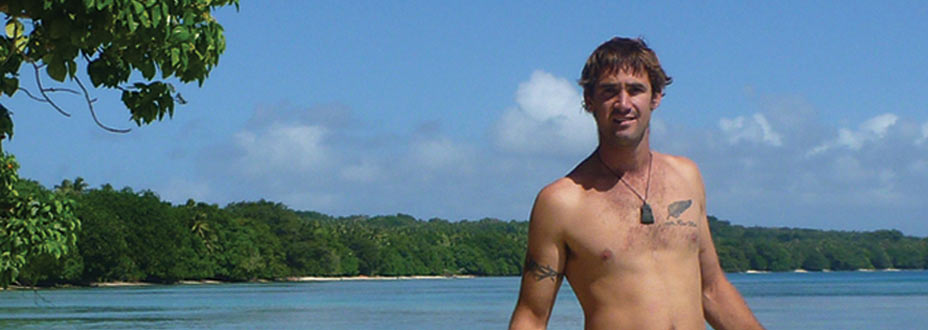
Small changes: big difference
In February, Andrew Bird swapped life at Otago for the idyllic Vanuatu island of Espiritu Santo.
He is one of 11 students this year taking part in the UniVol programme and has been living and working with the Ni-Vanuatu people on a research farm to the north of Luganville, Vanuatu's second biggest town.
The farm aims to find ways to improve the local production of root crops, coconuts, bananas, cocoa, coffee, vanilla and peppers, as well as livestock, and to disseminate this knowledge into the small rural communities. With a background in farming, a recently completed degree in environmental management and economics, and a long-standing interest in VSA, Andrew was perfect for the job.
“Building on the work done by an earlier volunteer, my key role is to help train the new head stockman to manage the livestock alone and to maintain breeding and stock rotation programmes that have been introduced. A big part of this is teaching new computer skills for farm recording and planning, and general management.”
As well as working, Andrew has become part of the community. Living in a small two-bedroom house which he describes as a definite step-up from most student flats, he has learned to speak the local pidjin English called Bislama, joined the football team and helped organise a rodeo event which doubled as an opportunity to share his farming knowledge. Fishing trips, barbecues and birthday parties with other volunteers and ex-pats have helped make his time in Vanuatu “truly awesome”.
“After about three months here I could really start to see how I could make a difference. It's not so much the big changes, but little things such as improvements in stock-handling that can be implemented every day, better time management and the making of realistic daily plans. These are the sorts of things that will be easy for the farm workers to continue to do after I leave.
“VSA volunteers and Kiwis in general are really well accepted and respected here. But while I am trying to teach new skills, I have found that I am learning even more. I have proved that I can learn a new language, I have made new friends, gained a new sense of perspective and have learned the freedom of a society without all the cotton-balling and rules that impinge on everyday life.”
The UniVol programme
UniVol is a collaboration between the University of Otago and VSA (Volunteer Service Abroad), and the brainchild of Professor of Geography Tony Binns who had run a similar programme at the University of Sussex, in the UK.
Since UniVol began in 2007, 46 selected students have travelled to developing countries, living and working in local communities, equipped with a combination of university-learned knowledge, practical skills, energy and enthusiasm. Placements have included developing countries in Africa and Asia, but more recently the focus has been in the Pacific.
Students come from Otago's Department of Geography and all are required to be studying development studies to the 300-level or higher. They take a year off from academic life and spend 10 months in the field, undertaking a range of development projects such as community education, administrative tasks, farming and carpentry.
Binns says the programme has been a resounding success and was expanded in 2010 to include development studies students from Victoria University, Wellington. “Most students adapt quickly to their new environment, learning the local language and developing close relationships within the community.”
It's been a win-win project for all involved, he says. Students gain invaluable life experience in areas closely related to their studies; the communities in which they are working gain from their knowledge and skills; and VSA – whose volunteers are typically in their 50s – benefits from their youthful enthusiasm and the positive relationships that are built between the students and the local communities.
“These students make great ambassadors for both New Zealand and the University of Otago.”